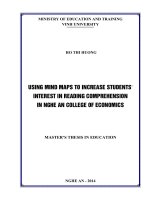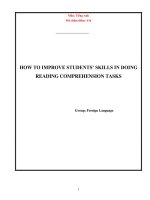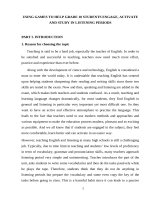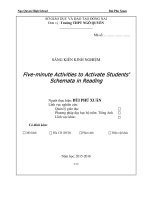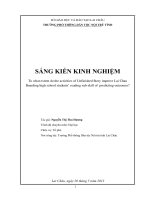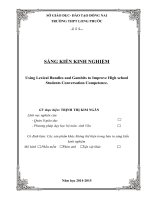skkn tiếng anh five minute activities to activate students schemata in reading
Bạn đang xem bản rút gọn của tài liệu. Xem và tải ngay bản đầy đủ của tài liệu tại đây (1.03 MB, 17 trang )
Ngo Quyen High School
Bui Phu Xuan
SỞ GIÁO DỤC VÀ ĐÀO TẠO ĐỒNG NAI
Đơn vị : Trường THPT NGÔ QUYỀN
___________________
Mã số: …………………..
SÁNG KIẾN KINH NGHIỆM
Five-minute Activities to Activate Students'
Schemata in Reading
Người thực hiện: BÙI PHÚ XUÂN
Lĩnh vực nghiên cứu:
Quản lý giáo dục
Phương pháp dạy học bộ môn: Tiếng Anh
Lĩnh vực khác:
Có đính kèm:
Mô hình
Đĩa CD (DVD)
Phim ảnh
Năm học: 2015-2016
***
Hiện vật khác
Ngo Quyen High School
Bui Phu Xuan
SƠ LƯỢC LÝ LỊCH KHOA HỌC
__________________________
I. THÔNG TIN CHUNG VỀ CÁ NHÂN
1. Họ và tên:
BÙI PHÚ XUÂN
2. Ngày tháng năm sinh : 02 / 09 / 1976
3. Nam/Nữ:
Nam
4. Địa chỉ: 103/71 Đường 30/4 Phường Trung Dũng Thành Phố Biên Hòa Tỉnh Đồng Nai
5. Điện thoại:
Cơ quan: 061.3829029
6. Fax:
Nhà riêng: 061.3819495
E-mail:
7. Chức vụ: Thư ký HĐ
8. Nhiệm vụ được giao: Thư ký HĐ, chủ nhiệm lớp, giảng dạy bộ môn tiếng Anh
9. Đơn vị công tác: Trường THPT NGÔ QUYỀN
II. TRÌNH ĐỘ ĐÀO TẠO
- Học vị (hoặc trình độ chuyên môn, nghiệp vụ) cao nhất: Thạc Sỹ
- Năm nhận bằng: 2007
- Chuyên ngành đào tạo: Giảng Dạy Tiếng Anh
III.
KINH NGHIỆM KHOA HỌC:
- Lĩnh vực chuyên môn có kinh nghiệm: Giảng dạy bộ môn Tiếng Anh
- Số năm có kinh nghiệm: 17 năm
- Các sáng kiến kinh nghiệm đã có trong 5 năm gần đây:
+ Pre-Listening activities.
+ Strategies for Developing Reading Skills Skimming and Scanning
+ Arousing Students’ Interest in Reading.
+ Using Interactive Tasks to Arouse High School Students’ Interest in
Learning Speaking.
+ Using Communicative Tasks or Activities to Promote High
School Students' Grammatical Competence.
Ngo Quyen High School
Bui Phu Xuan
TOPIC: Five-minute activities to activate students'
schemata in reading
I. INTRODUCTION:
L
earning English is considered to be very essential in our modern society
nowadays. English is one of the core subjects in all Vietnamese junior and senior
high schools, colleges and universities. However, classroom teaching is a demanding
job and most Vietnamese teachers have to work with a class of forty five students or
more and there is usually a wide variety of abilities in each class. When teaching
reading, the teachers always play the centred roles, the students sit passively and do
nothing. What they do is to listen to the teacher and then copy everything on the
board into their notebooks.
At the end of the reading lesson students usually feel tired and bored, they find no
pleasure in the act of reading. Some of them just struggle with the text (e.g.:
unknown words and complicated grammar rules) to find the answers to
comprehension questions.
As English teachers, we should try our best to give the students as many
opportunities as possible to take part in active activities in the classroom. It is our
own job to make the classroom a lively and communicative place. How can we
create such a classroom? My experience has taught me that five-minute activities
can spark students’ curiosity and promote a comfortable atmosphere.
Ngo Quyen High School
Bui Phu Xuan
We can use some of the activities or games at the beginning of the class to attract
students’ attention and to engage them in the lesson.
Five-minute activities are believed to be an essential component to generate positive
students’ attitudes toward learning reading. They really help to arouse the students’
interest as well as attention in the lessons. As a result the students will get more
involved in the class and a better learning process will take place.
II. RATIONALE OF THE STUDY
A. The importance of reading:
Reading is one important way to improve your general language skills in English for
the following reasons:
Reading helps you learn to think in English.
Reading can enlarge your English vocabulary.
Reading can help you improve your writing.
Reading is a good way to find out about new ideas, facts, and experiences.
Reading helps you raise your knowledge and general culture.
Reading will also make you travel and use your imagination in ways you
never imagined.
Reading is a good way to transport yourself to the other side of the world or to
a fantastic universe full of strange people.
As Doff (1988) comments that reading involves looking at sentences and words,
recognizing them and understanding them – it is a process of making sense of
written language.
Warming up activities can foster motivation and this is, in turn, an essential
component when planning warming up activities. According to Dornyei (2001),
teachers need to try and actively generate positive students' attitudes toward
learning. He also claims that the key issue in generating interest is to widen the
Ngo Quyen High School
Bui Phu Xuan
student's appetite; that is, to arouse the students' curiosity and attention and to create
an attractive image for the class so that they will get more involved with it and a
better learning process will take place.
Allwright (1984) believes that we can design some activities to attract students to
attract students' attention, to help them put aside distracting thoughts and to get them
ready to focus individually and as groups on whatever activities that follow.
B. The aim of the innovation:
Using Five-minute activities to activate students' schemata in reading
C. The participants of the study:
Tenth grade to twelfth grade students in Ngo Quyen High School were chosen to
take part in the innovation.
D. Timing:
The activities finish in about 5 minutes of lesson time, but some can be even
shorter and others can be lengthened.
E. Content of the topic:
This contains some of the activities that teachers can use in class and I use the
Units in “English books 10 & 12” as examples in my activities.
III. PROCEDURE:
1. Activity 1 : Mind-mapping
We can use this activity in order to get the students’ attention to the content of
the new lesson and at the same time give them a chance to review and enrich
their vocabulary.
Before beginning, the teacher takes a key word in the reading passage and asks
the students to suggest all the words which associate with it. Write each
Ngo Quyen High School
Bui Phu Xuan
suggestion on the board with a line joining it to the original word in a circle, so
that you get a “sunray” effect. Let’s take Unit 3: PEOPLE’S BACKGOUND
(English 10) as an example:
Teacher writes down the word FAMOUS SCIENTIST on the board and has
students brainstorm all the words they can think of:
FAMOUS SCIENTISTS
The word SCHOOL may produce something like the sketch below
education
discoveries
degree
Nobel Prize
inventions
FAMOUS
SCIENTISTS
research
brilliant
achievements
ambitious
Ngo Quyen High School
Bui Phu Xuan
2. Activity 2: Collocation
Let’s take Unit 6: FUTURE JOBS (English 12) as an example:
- Have students work in groups of 4.
- Each group is given a set of word cards as follow:
dressing
SELF-CONFIDENT
answer
A smiling
gesture
responsibility
- Prepare another set of cards (see below) and stick the cards one by one on the
board.
- Get the groups to choose and stick the appropriate cards to the ones on the board
to make meaningful phrases.
- Give one point to the first group who gives the correct answer
- The group having the most points wins.
- Here are the cards to stick on the board:
FACE
NEATLY AND
A NICE
FORMALLY
CLEAR AND HONEST
Expected answers:
- a nice gesture
- dressing neatly and formally
- a smiling face
- clear and honest answer
- sense of responsibility
FEELING
SENSE OF
Ngo Quyen High School
Bui Phu Xuan
- feeling self-confident
3. Activity 3: Opposites
We can use this kind of activity to review the vocabularies of the previous
lesson. For example, before teaching Unit 4 “Special Education” English 10,
the teacher can use this activity to review the vocabularies of Unit 3 “People’s
Background”.
The teacher writes some words on the board, has students work in pairs or
groups of four to discuss and note down the opposites. Then the teacher checks
and supplies any words the students didn’t know.
Examples :
Ambitious
Unambitious
Mature
Immature
Humane
Inhumane
Possible
Impossible
Appropriate
Inappropriate
Like
Dislike
Perfectly
Imperfectly
Quickly
Slowly
Real
Unreal
Careful
Careless
If by the end of the activity all the pairs of opposites have been written on the
board, erase the original words you gave and see if the students can recall them
from the ones remaining. Or we can ask the students to make their own sentences
using those words.
Ngo Quyen High School
Bui Phu Xuan
4. Activity 4: Matching
We can use this kind of activity to introduce the new lesson as well as draw
students’ attention on the theme of the unit.
Let’s take Unit 2: CULTURAL DIVERSITY (English 12) as an example:
The teacher has students work in groups of four, and asks them to match the
picture of the weddings with the country it belongs to. Each picture is typical of
the wedding of a country or culture.
1. Indian wedding
2. Thai wedding
3. American wedding
4. Vietnamese wedding
5. Korean wedding
6. Japanese wedding
The teacher invites some representatives of the groups to give their answers and
explain them if possible in front of the class.
Examples :
Picture 1
Picture 2
Ngo Quyen High School
Bui Phu Xuan
Picture 3
Picture 4
Picture 5
Picture 6
Teachers gives students the answers.
- Indian wedding
Picture 2
- Thai wedding
Picture 4
- American wedding
Picture 6
- Vietnamese wedding
Picture 1
- Korean wedding
Picture 3
- Japanese wedding
Picture 5
Let’s take Unit 11: BOOKS (English 12) as another example:
- The teacher has students work in groups of four and asks them to match the names
of the authors in column A with their relevant works in column B.
- The first group to have correct answers is the winner.
Ngo Quyen High School
Bui Phu Xuan
A
B
1. O. Henry
A. War and Peace
2. J. K. Rowling
B. The Old Man and the Sea
3. Charles Dickens
C. Murder on the Orient Express
4. Ernest Hemingway
D. Harry Potter
5. Margaret Mitchell
E. The last leaf
6. Leo Tolstoy
F. Oliver Twist
7. To Hoai
G. Gone with the Wind
8. Agatha Christie
H. Diary of a Cricket
KEY:
1. E
5. G
2. D
6. A
3. F
7. H
4. B
8. C
OR: in Unit 14: INTERNATIONAL ORGANIZATIONS (English 12)
- Divide the class into two groups A & B
- Stick the symbols/logos of the international organizations to the board.
- Distribute the cards of the name of the International Organizations to the
students: UNESCO, FIFA, WWF, UN, UNICEF, WHO
- Call out the symbols in any order and the representatives of each group should
run to the board and stick the names under the symbols.
- The group with more correct answers will be the winner.
- Give more information about the organization and introduce the new lesson.
Ngo Quyen High School
Bui Phu Xuan
1
2
3
4
5
6
Ngo Quyen High School
Bui Phu Xuan
KEY
1. WWF
2. UNESCO
3. UN
4. UNICEF
5. WHO
6. FIFA
5. Activity 5: Surveying
This activity aims to give the students a chance to interact with each other
talking about their tastes before studying the new lesson.
The teacher writes about five or six names of items or topics in the same field
on the board for example colours, songs, films, singers, television
programmes or school subjects etc. Identify each by a letter : A , B, C, D etc.
Example:
Before teaching Unit 2 “School Talks” English 10, we might give:
A. Sports and games
B. Entertainment
C. Health problems
D. Hobbies
E. Holidays
F. Weather
G. Films
H. Work and study
Ngo Quyen High School
Bui Phu Xuan
Each student writes down the letters in order of preference: If FILMS is
his/her favourite then he/she will write G at the top of the list. Those who
finish early can compare and discuss their choices with their neighbours.
When the students have finished, we can hold a vote to see which choices
were the most popular. If we have time, discuss different tastes, and see if
there is a general consensus on favourites. After that we can tell the students
the most common topics that students often talk about when they meet their
friends.
Ngo Quyen High School
Bui Phu Xuan
IV. FINDINGS:
Questionnaire
The purpose of this survey is to find out about the students’ achievements in
reading classes, students’ feelings and attitudes to the reading.
Question: How far do you agree with the following statements?
1. strongly disagree
2. disagree
3. neutral
4. agree
5. strongly agree
Statements
1
2
3
4
1. My reading skills improve a lot thanks 77,5% 15%
7,5%
to this reading class.
2. My reading class is very enjoyable 62,5% 17,5% 12,5% 7,5%
and interesting.
3. 3. I feel interested in completing the 70%
5%
15% 10%
tasks with my partners.
4. I feel very interested in the lesson
57,5% 27,5% 10%
5. I like reading more if I have free time
after class.
62,5% 22,5% 10%
5
5%
5%
Ngo Quyen High School
Bui Phu Xuan
V. CONCLUSION:
All the activities mentioned above aim at making students concentrate on
their reading lessons as much as possible, helping them have some initial ideas of
the lesson they are learning; and the most important thing that I would like to
gain from these activities is to make my students hold interest in their lessons. In
carrying out this research, I strongly believe that students’ interest in the lessons,
particularly reading lessons is of great importance in the teaching and learning of
English as a foreign language. My research project hopefully proves that
interesting and meaningful activities at the beginning of a lesson will make a
decision on the success of the lesson in which there is a requirement or
encouragement of student individual roles in the class. The success of the abovementioned activities also reminds students to take their responsibility for their
English learning, their co-operative learning; and they must think that their
teacher of English is not a source of knowledge for them to go to school to get
that knowledge.
NGƯỜI THỰC HIỆN
Bùi Phú Xuân
_______________________
Ngo Quyen High School
Bui Phu Xuan
REFERENCES
_________
Allwright, R. (1984). The importance of interaction in classroom language learning. Applied
Linguistics, 5(2), 156-171.
Doff, A. 1988. Teach English: A Training Course for Teachers. Cambridge University
Press.
Dornyei, Z. (2001). Motivational strategies in the English classroom. Cambridge: Cambridge
University Press.
English Book 10. Education Publishing House
English Book 12. Education Publishing House
________________________________

